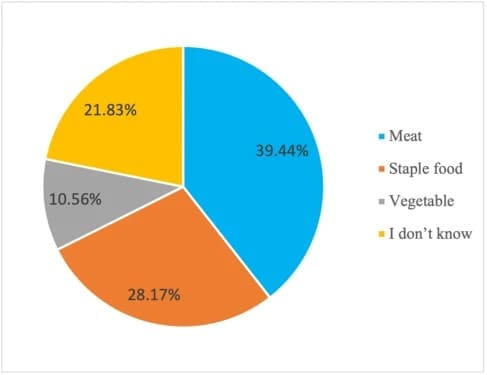By Lingnan University (LU), Hong Kong
To mitigate global warming, the Hong Kong Government is striving to achieve carbon neutrality before 2050. A relatively concentrated energy and resource consumption industry, catering’s carbon emissions cannot be overlooked, and Lingnan University’s Hong Kong Institute of Business Studies (HKIBS) recently released a series of Hong Kong Catering Industry Carbon Neutrality Challenge reports. Their survey found that over 90 per cent of consumers are willing to patronise low-carbon restaurants, but few respondents understand the meaning of carbon footprint. Restaurant managers said that high costs and technical difficulties are the most common problems in implementing low-carbon operations.

The research team conducted two rounds of questionnaire surveys. The first was carried out between January and March 2023 to understand consumer awareness and willingness to consume low-carbon catering, and 142 valid consumer questionnaires were collected through random sampling at high-traffic areas such as MTR stations and shopping malls. The second round of research was conducted between December 2023 and March 2024, when 143 valid questionnaires were collected from restaurant managers, employees, and consumers through random sampling across 26 restaurants in Hong Kong, Kowloon, and the New Territories in order to understand the status quo and challenges of low-carbon operations in the catering industry. The sample included five large-scale restaurants (such as TamJai Yunnan Mixian, McDonald’s, etc.) with more than 100 branches, 11 medium-sized restaurants (such as Mak’s Noodle, Sushiro etc.) with 10 to 100 branches, and 10 small restaurants with fewer than 10 branches. All respondents were over 18 years old.
The first round of the survey found that the respondents had a low awareness of their carbon footprint. Less than 40 per cent (39.44 per cent) of them were able to correctly identify meat as the food with the highest carbon footprint, and over 20 per cent (21.8 per cent) replied “don’t know” . More than 70 per cent (73.9 per cent) of respondents believe that restaurants adopting low-carbon operations receive benefits, while fewer than 20 per cent (18.3 per cent) think low-carbon operations may have a negative impact on restaurant operations. The survey also found that although over 90 per cent (97.2 per cent) of respondents expressed willingness to patronise low-carbon restaurants, with over a quarter (27.5 per cent) giving a high degree of willingness , over 60 per cent (66.2 per cent) said they would only be willing to pay an extra HK$100 or less per meal to support them.
In the second round of the survey, the research team conducted a comprehensive study of the status quo and challenges of low-carbon operations in the catering industry from the different perspectives of restaurant managers, employees, and consumers where respondents were asked to rate their perceptions on various issues. Restaurant managers scored lower than employees and consumers. It is worth noting that when asking about respondents’ willingness to change their eating habits to reduce carbon emissions, the lowest scores were given by restaurant managers, employees and consumers, indicating a relatively low willingness to change eating habits to reduce carbon emissions. In terms of low-carbon operations in restaurants, large-scale restaurants outperform medium and small-sized restaurants in low-carbon awareness, commitment, and governance. On a 100-mark scale, large restaurants scored 71.2 marks, while medium and small restaurants scored 67.8 and 64.2 marks, respectively.
The survey also revealed that over 75 per cent (75.4 per cent) of respondents were optimistic about low-carbon restaurant operations. They believe that these operations can align with the latest plastic-free campaign in Hong Kong, protect the environment, help restaurants build a green, low-carbon brand image, reduce long-term operating costs, and improve operational efficiency as well as provide more choices for the public to try low-carbon dining, and promoting physical and mental health.
The study summarised the challenges and difficulties respondents face in going to low-carbon restaurants, including 1). The high upfront investment required for low-carbon operations leads to increased costs. 2). Technical difficulties encountered in the energy and equipment transformation required for low-carbon operations. 3). Lack of sufficient policy support for restaurants to develop and implement low-carbon operation plans according to standardised policy guidelines. 4). Potential impact on the taste and quality of dishes, which could result in losing customers as restaurants make changes to adopt low-carbon operations. 5). Difficulties in employee training. 6). Challenges in monitoring and supervision.
When asked what type of support they hope to receive, as many as 92 out of 143 respondents expressed the need for financial support. 81 respondents indicated that they expect to receive technical support. 73 and 57 respondents, respectively, expressed the need for knowledge-based training and management-focused training support. When asked which institutions they wish to receive help from, 126 respondents said government departments and 96 said the Hong Kong Federation of Restaurants and Related Trades.
The Lingnan research team concluded: “The catering industry not only directly influences carbon emissions in the procurement of ingredients, energy usage, and waste management, but also indirectly impacts the carbon footprint of society through customer choice and behavioural patterns. Therefore, the low-carbon transformation of the catering industry has far-reaching implications for driving the entire society to achieve carbon neutrality. The government could provide financial assistance to alleviate the economic burden on restaurants during the initial stages of the low-carbon transition. For restaurants that proactively participate in low-carbon renovations, the government could offer preferential policies such as tax reductions to incentivise the adoption of environmental protection measures. Furthermore, the government could help restaurants reduce transformation costs by facilitating bulk procurement of energy-efficient equipment and appliances, allowing them to obtain energy-saving devices at lower prices.”
The research team also suggested that the government could collaborate with relevant social organisations to launch targeted support measures, such as organising low-carbon catering technology training sessions covering operational strategies and cost management, which would provide professional guidance and technical services to interested restaurants. The government should also introduce specific measures to unify industry low-carbon standards, and create reward and punishment mechanisms and a supervisory system to ensure consistent industry execution. It should promote public education to increase awareness of carbon neutrality and low-carbon lifestyles, for example, encouraging consumers to choose low-carbon catering services by issuing coupons or promoting marketing activities for low-carbon restaurants.
More information: Lingnan University – Press Release Featured image credit: Aleksandar Pasaric | Pexels




